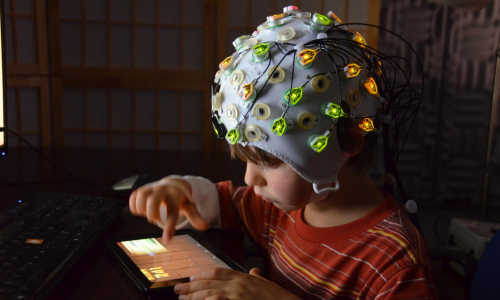University of Chicago developmental neuroscientists have found specific brain markers that predict generosity in children. Those neural markers appear to be linked to both social and moral evaluation processes.
Children were monitored with EEGs while watching animated characters perform prosocial and antisocial behaviors, and later participated in a task measuring generosity. Photo Credit: Jean Decety/University of Chicago
There are many sorts of prosocial behaviors. Although young children are natural helpers, their perspective on sharing resources tends to be selfish. Jean Decety, the Irving B. Harris Professor of Psychology and Psychiatry, and Jason Cowell, a postdoctoral scholar in Decety’s Child NeuroSuite lab, wanted to find out how young children’s brains evaluate whether to share something with others out of generosity. In this study, generosity was used as a proxy for moral behavior. The paper is published online by Current Biology and will appear in the Jan. 5, 2015 issue.
“We know that generosity in children increases as they get older,” said Decety. He added that neuroscientists have not yet examined the mechanisms that guide the increase in generosity. “The results of this study demonstrate that children exhibit both distinct early automatic and later more controlled patterns of neural responses when viewing scenarios showing helping and harmful behaviors. It’s that later more controlled neural response that is predictive of generosity.”
The study included recording brain waves by EEG and eye tracking of 57 children, ages three to five, while they viewed short animations depicting prosocial and antisocial behaviors of cartoon-like characters helping or hurting each other. Following that testing, the children played a modified version of a scenario called the “dictator game.” The children were given ten stickers and were told that the stickers were theirs to keep. They were then asked if they wanted to share any of their stickers with an anonymous child who was to come to the lab later that day.
The children had two boxes, one for themselves and one for the anonymous child. In an effort to prevent bias, the experimenter turned around while the child decided whether or how much to share. On average, the children shared fewer than two stickers (1.78 out of 10) with the anonymous child. There was no significant difference in sharing behavior by gender or age. The authors also found that the nature of the animations the children watched at the outset could influence the children’s likelihood of behaving in a generous way.
The study shows how young children’s brains process moral situations presented in these scenarios and the direct link to actual prosocial behavior in the act of generosity by sharing the stickers. “The results shed light on the theory of moral development by documenting the respective contribution of automatic and cognitive neural processes underpinning moral behavior in children,” Decety concluded in the paper.
The developmental scientists found evidence from the EEG that the children exhibited early automatic responses to morally laden stimuli (the scenarios) and then reappraised the same stimuli in a more controlled manner, building to produce implicit moral evaluations.
“This is the first neuro-developmental study of moral sensitivity that directly links implicit moral evaluations and actual moral behavior, and identifies the specific neuro markers of each,” said Decety. “These findings provide an interesting idea that by encouraging children to reflect upon the moral behavior of others, we may be able to foster sharing and generosity in them.” Decety added that these findings show that, contrary to several predominant theories of morality, while gut reactions to the behavior of others do exist, they are not associated with one’s own moral behavior, as in how generous the children were with their stickers.
Story Source:
The above story is based on materials provided by Technischen Universität München.





